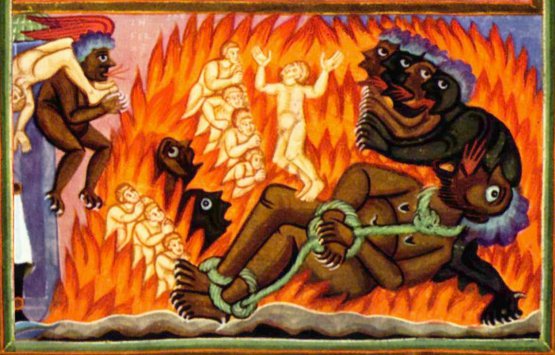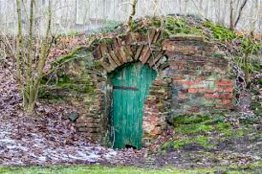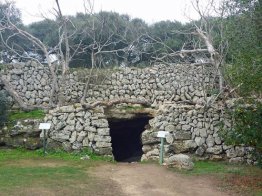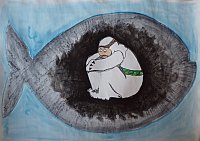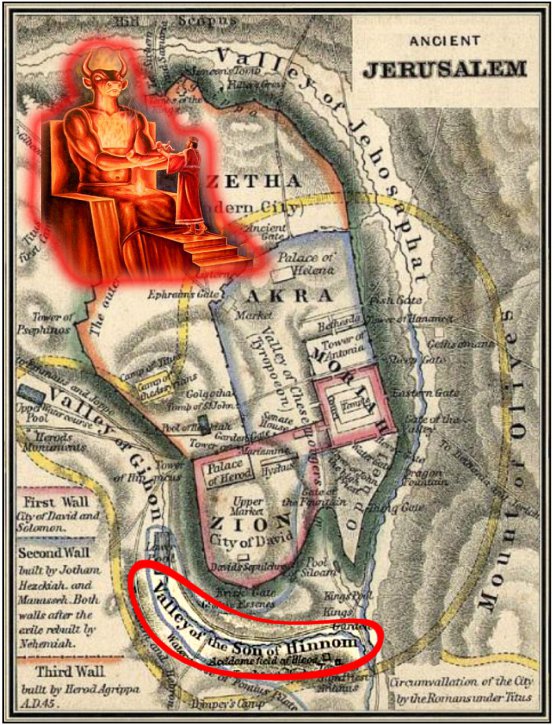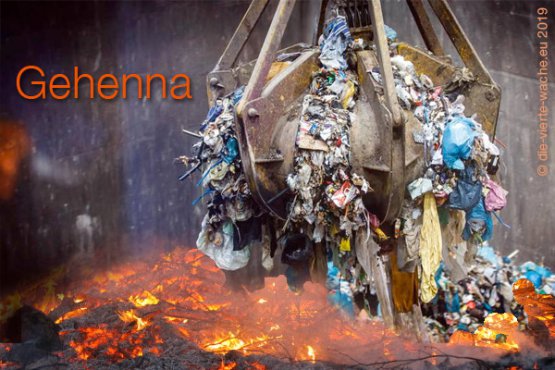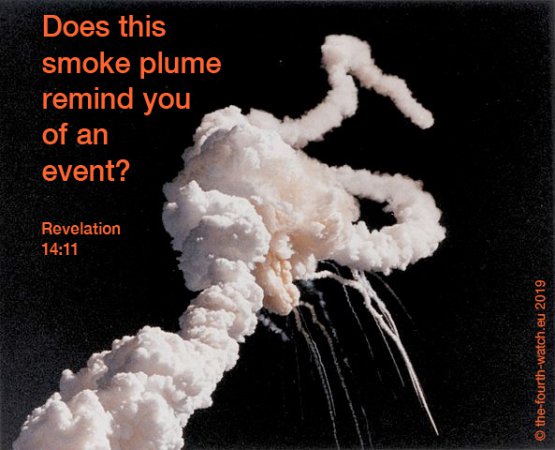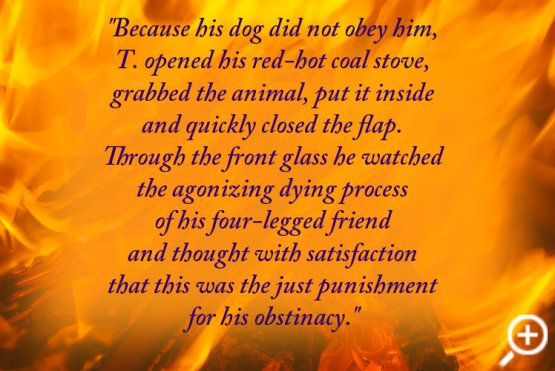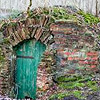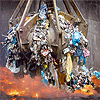Is There Really a Hell of Fire?
2019-2023
Is hell really as hot and terrible as believers have been taught for centuries until today? Did a God who is love really create a place where he tortures evildoers and those who do not want to believe in him for all eternity, burning them with hellish pain while they are conscious?
Strange ... Adam and Eve were perfect people who ate of the forbidden fruit. God said that the day they ate of it, they would lose their eternal life and die. These disobedient, rebellious people were to return to the dust (elements of the earth) from which God had created Adam. Their life actually ceased. (Or have you ever seen a married couple without a navel?).
But we imperfect human beings, born with original sin (mortal), separated from God, have to live on in eternal torment in a sea that burns forever, with hellish pain? A place for the imperfect descendants of Adam and Eve? Strange and difficult to understand, isn't it ....?
Moreover, in contradiction with God's own statements and in line with the first lie Satan uttered. ("You will certainly not die if you eat of the fruit of this tree.") God says that he has no pleasure in the destruction (permanently) of godless people and evildoers.
But annihilation is something different than continuing to live in hellish torment for all eternity. This is the "second" lie, which is in harmony with the first lie. Existence is something else than non-existence, and death is something else than living on.
Many people think that the soul is something like a spiritual, non-material body that lives on after we die. But God also says that the soul that sins will die, that is, cease to exist (Ezekiel 18:4). Do good people disappear into heaven, do they actually not die either? John chapter 3 verse 13 says:



"No one has ascended into heaven except he who descended from heaven, the Son of Man."
(John 3:13 ESV)
Would God have to overturn His entire plan of creation through the rebellion of an anointed cherub (who made himself Satan), who also incited many people and other angels (spirit creatures) to rebel and disobey God? Is God not omnipotent, after all, that he cannot carry out his plan of creation because of these rebels?
How then should or must we understand it..., what are errors and false doctrines, and what agrees with what the Bible conveys to us? In the following article we have tried to explain clearly and understandably the subject of hell and its real (original) meaning, and what false teachers have made of it.
Because the word "hell" is an ancient word, originally a good translation for the words Sheol and Hades in the original text. But because it later acquired a completely different meaning, these words can be better translated as "grave, sepulcher, burial cave," so that this is not misunderstood as it so often is.
This erroneous teaching is not only seen with us Christians and with Muslims..., but many religions have similar ideas in their beliefs. But is this not rather the handwriting of Satan, a vengeful God (2 Corinthians 4:4) than of a loving, merciful God?
If Almighty God Yahuwah says He has no pleasure in the death and annihilation (non-existence) of ungodly wicked people-does annihilation then involve letting someone live on forever in a place of eternal torment and pain, horror and torture....? Doesn't such an approach fit much more with a sadistic, bitter, vengeful Satan? Just by thinking logically, we come to logical conclusions.
But then, what exactly is meant by hell?
First of all, hell is not hot, and it does not burn there, but it is rather very quiet, dark and often humid there.... Have you now understood sufficiently that the doctrine of hell is different in many respects from the original meaning?
Are you someone who wants to know exactly what it is all about, then please read on.
Millions of Christians, Jews, Muslims, Hindus and Buddhists are taught that there is a place of eternal fire torment where the wicked go. This place has many names: Hell, Sheol, Jahannam ...
The Catholic Church teaches that hell is eternal; its sufferings would have no end. According to Jewish legend, at least the forefather Abraham can bring people out of torment. In Islam, the torment in the fire lasts as long as Allah wills; until then, "as often as their skin is burnt, they receive another skin, that they may taste the punishment" (Sura 4:56, Q'ran) ...!
How terrible! No wonder people refuse to even know such a cruel God!
But what does the Holy Scripture, the inspired Word of God, really say on this subject?
Did Almighty God Create Such a Place of Torment?
In ancient times, when the people of Israel started burning (sacrificing) children alive in the fire like the neighboring nations, YHWH God very clearly explained His point of view:



"And they have built the high places of Tophet, which is in the valley of the son of Hinnom, to burn their sons and their daughters in the fire; which I commanded them not, neither came it into my heart."
(Jeremiah 7:31 KJV)
Please consider: If the thought of burning people alive in the fire never arose in the heart of God - how can it be that He created a hell of fire for people?
The Bible says that "God is love" (1 John 4:8). Would a loving God really torture people forever? Would YOU do such a thing? Would YOU punish your child whom you love by pressing his hand on the hot stove top FOREVER?
A hell of fire is absolutely incompatible with the loving, righteous personality of Yahuwah God. More on this later.
So where does the idea of a fire hell come from?
In the Beginning Hell Was Cool And Dark ...
The English word "hell", the German word "Hölle" and the Dutch "hel" are derived from a common root:
- From the Germanic word "hel", which means "to hide, to keep" .
- The Norse goddess of the dead is called Hel.
- The eponymous realm of the dead Hel means "the keeping, the hiding, the shelter".
Who, Then, Made Hell a Hot Place?
We " thank " the shift of meaning to the hell of fire to
- the apocryphal Book of Enoch (1st century B.C.E.),
- the fantasy journey "Dante's Inferno" by the Italian Dante Alighieri (early 14th century) as well as
- Martin Luther's first German translation of the Bible (15th/16th century),
- as well as the King James Bible (1611).
In his German translation of the Bible, Martin Luther used the German word "Hölle" (hell) or "höllisch" (hellish) where the original text had the words "Sheol," "Hades" or "Gehenna." The King James Bible followed this example.
What was originally meant by these three ur-scriptural words (Sheol, Hades, Gehenna) that Luther translated as "hell"?
Sheol and Hades: the Grave
The place where people go at death is called "Sheol" in the Hebrew Scriptures and "Hades" in the Greek Scriptures. That these words mean the same thing is shown by a comparison of Psalm 16:10 with Acts 2:31:



"For you will not abandon my soul to Sheol, or let your holy one see corruption."
(Psalm 16:10 ESV)
"[David] foresaw and spoke about the resurrection of the Christ, that he was not abandoned to Hades, nor did his flesh see corruption."
(Acts 2:31; ESV)
So, Sheol and Hades are synonyms.
Is Sheol or Hades the "hell of fire"?
Read Acts 2:31 again. Who was in Hades but was not left there? Jesus Christ Himself, the only righteous man! Did God torture Him there in a hell of fire for His sins? Of course not, because God's Son did not commit any sin.
No, after Jesus died, he simply went to the grave.
Sheol = Hades = "grave" or realm of the dead.
In Sheol, according to the Bible, a person experiences - nothing.



"... for in the realm of the dead [Sheol], where you are going, there is neither working nor planning nor knowledge nor wisdom."
(Ecclesiastes 9:10b NIV)
At no point does the Bible associate the word Sheol with life, activity or torment, but always with death and inactivity.
Who Goes to Sheol?
In fact, not only bad but also good people go to Sheol or Hades. When faithful Job suffered greatly from Satan's blows, he pleaded with God:



"I wish you would hide me in a grave [Sheol] I wish you would cover me up until your anger passes by! I wish you would set the time for me to spend in the grave and then bring me back up!"
(Job 14;13 NIRV)
Job longed for death so that his suffering would end. If Sheol was a fiery place of torment, he would hardly have wished to go there, would he?
No, he simply wanted to rest in death until the resurrection.
Can You Come Out of Sheol Again?
Yes. After the prophet Jonah was swallowed by a large fish, he prayed in the belly of the fish. He later reports:



"And said, I cried by reason of mine affliction unto the LORD, and he heard me; out of the belly of hell cried I, and thou heardest my voice."
(Jonah 2:2 KJV)
"saying, “I called out to the Lord, out of my distress, and he answered me; out of the belly of Sheol I cried, and you heard my voice."
(Jonah 2:2 ESV)
The belly of the fish was certainly not a place of fiery torment, but it could have become Jonah's grave. In parallel, Yahusha ha-Mashiach (Jesus Christ) said about Himself:



"For as Jonas was three days and three nights in the whale's belly; so shall the Son of man be three days and three nights in the heart of the earth."
(Matthew 12:40 KJV)
Yahusha (Jesus) was dead in the grave for three days; then through the resurrection He came out of Sheol/Hades again, similar to how Jonah came out of the belly of the fish.
Through our Savior Yahusha, we too can come out of Sheol again! Let us look forward to the fulfillment of the biblical promise:



"[Jesus said to them:] Do not be amazed at this, for a time is coming when all who are in their graves will hear his voice and come out – ..."
(John 5:28, 29a NIV)
"The sea gave up the dead that were in it, and death and Hades gave up the dead that were in them, and each person was judged according to what they had done."
(Revelation 20:13 NIV)
Gehenna and the Lake of Fire: Annihilation
A common question is, "But surely the Bible talks about a hellfire and a lake of fire. Doesn't that prove that there is a place of torment?"
It is true that many Bible translations, such as the Luther Bible, speak of a "hellish fire" and of people going "to hell, to eternal fire" (Matthew 5:22, 29; Mark 9:43).
In these verses (as well as 9 other places), the original Greek text has the word "géenna." Did Luther translate this correctly as "hell fire"?
Let's look at the original text.
géenna = ge ben-hinnóm = valley of the son of Hinnom
The origin of the Greek "géenna" is the Hebrew "ge ben-hinnóm", the "valley of the son of Hinnom". This geographical location is south of Jerusalem, and it was there that the Israelites sacrificed their living children in the fire in the pagan worship of Baal. An abominable custom!
Then, under King Josijah, the Valley of Hinnom was transformed into a vast garbage dump where waste was completely burned with the addition of sulfur (2 Kings 23:10).
This was still the case when Yahusha (Jesus) lived on earth. "Gehenna" was the place where garbage, animal carcasses, and even the corpses of criminals were thrown - but never living creatures!
When Yahusha said to the wicked spiritual leaders:



"Ye serpents, ye generation of vipers, how can ye escape the damnation of hell [*Gehenna]?"
(Matthew 23:33 KJV)
all his listeners understood what he meant: complete and eternal destruction, similar to the way the garbage in the valley of Hinnom disappeared forever. Whoever sins against the holy spirit with full consciousness (and the Pharisees and scribes did) cannot hope for resurrection.
Gehenna = gone forever
And the " Lake of Fire " in Revelation 20:10?
Again, the Bible explains itself. Revelation chapter 20 verse 14a explains the deeper symbolic meaning:



"Then death and Hades were thrown into the lake of fire. The lake of fire is the second death."
(Revelation 20:14 NIV)
i.e. eternal death or annihilation, similar to Gehenna.
Moreover, the lake of fire must be meant symbolically and not literally, because death and Hades (grave) as well as the symbolic "wild beast" are thrown into it, i.e. eliminated or destroyed.
And What About Eternal Torment?
But does not Revelation 20:10b say that the devil, wild beast and false prophet will be tormented forever in the lake of fire? And is it not said of every person who takes the mark of the "wild beast":



" 10 ... he will be tormented with fire and sulfur in the presence of the holy angels and in the presence of the Lamb.
11 And the smoke of their torment goes up forever and ever, and they have no rest, day or night, ...”
(Revelation 14:9-11)
If the lake of fire means the second death and dead people no longer perceive anything (see above, Ecclesiastes 9:5, 10), then this statement makes no sense.
The key to understanding lies again in the original text, in the Greek word for "torment" = "basanizó" or "torment" = "basanismos".
"basanizó" means first:
- Testing by rubbing against a touchstone (e.g., metals),
- then embarrassing questioning (as in the inquisition),
- suffer,
- torture or torment others.
"basanismos" can mean: Torment, or tantalizing detention.
"basanistés" are torturers, or simply prison guards.
(Source: Strong´s Greek Nr. 928. basanizó)
What does it mean?
Lake of fire: Trapped forever in non-existence
Those who are thrown into the "lake of fire" are, so to speak, imprisoned forever in the "second death"; they never come back to existence.
This view is supported by Jude verse 7, where there is also talk of an eternal fire:



"just as Sodom and Gomorrah and the surrounding cities, which likewise indulged in sexual immorality and pursued unnatural desire, serve as an example by undergoing a punishment of eternal fire."
(Jude 7 ESV)
Sodom and Gomorrah are obviously no longer literally burning today, but their depravity and punishing destruction have been a burning warning sign (beacon) for thousands of years, a "deterrent example for all" with an eternal after-effect, just as a plume of smoke continues to point to what happened long after a major fire.
The result of its thorough examination and condemnation is eternal: a precedent.
.
We find a similar word picture in Isaiah chapter 34:



„And the streams of Edom shall be turned into pitch, and her soil into sulfur; her land shall become burning pitch.
Night and day it shall not be quenched; its smoke shall go up forever. From generation to generation it shall lie waste; none shall pass through it forever and ever."
(Isaiah 34:9-10 ESV)
The Edomites received this severe punishment from Almighty God Yahuwah because they had been very hostile to His people Israel, their own brother nation.
Is Edom still burning today? Is smoke still rising? No. So the "unquenchable fire" and the "everlasting smoke" have a different meaning, as the following verses show:



„But the hawk and the porcupine shall possess it, the owl and the raven shall dwell in it. He shall stretch the line of confusion (*formlessness) over it, and the plumb line of emptiness. 12 Its nobles—there is no one there to call it a kingdom, and all its princes shall be nothing."
(Isaiah 34:11-12 ESV)
Desolation, emptiness, nothingness - eternal fire with pitch and brimstone and eternal smoke simply stand for final destruction.
Therefore, Revelation 14:11 could be interpreted this way:
"Whoever worships the wild beast will be completely destroyed before the holy angels and before the Lamb. And the chilling effect of their fate ascends from eternity to eternity, without pause and without end."
And the Parable of Lazarus and the Rich Man?
Why did Yahusha tell this parable:



"... 22 And it came to pass, that the beggar died, and was carried by the angels into Abraham's bosom: the rich man also died, and was buried;
23 And in hell he lift up his eyes, being in torments, and seeth Abraham afar off, and Lazarus in his bosom.
24 And he cried and said, Father Abraham, have mercy on me, and send Lazarus, that he may dip the tip of his finger in water, and cool my tongue; for I am tormented in this flame. ..."
(Luke 16:19-31 KJV)
The word that the translators of the King James Bible translated as "hell" is "hades" (the grave of mankind). Now please think for yourself:
- Is "hell" or the grave within shouting distance of heaven?
- He who literally sits in the fire no longer discusses, but screams like crazy.
- How shall only ONE drop of water bring relief to the rich?
- In death there is no more thought and reflection; it is like a dreamless sleep (Ecclesiastes 9:5, 10; cf. John 11:11, 13, 14).
This is clearly not a factual account, but a parable. Why did Yahusha tell this parable? There are several possible explanations:
- Yahusha's parable was directed at the arrogant spiritual leaders ("the rich man") who did not believe in him and neglected the common people ("Lazarus") who accepted the Son of God.
- The description of the rich man fits exactly the incumbent high priest Caiaphas: he wore purple and linen, had five brothers (brothers-in-law) in his (father-in-law's) house.
- Mocking parody of the Pharisees' belief in "Abraham's bosom," a heavenly place of bliss.
- At the same time sharp criticism of the unbelief of the Sadducees who denied the raising of the real Lazarus of Bethany, AND prediction of their unbelief in the then still imminent raising of Jesus.
How Yahusha actually meant it, I guess we won't know until he returns ....
Finally, two more questions to your logic, your common sense ...
Question 1: Was the Devil Right After All?!
It was the devil who said to Eve, "You will definitely not die" (Genesis 3:4). In doing so, he contradicted YHWH God, who had clearly said to Adam, "You will surely die." (Genesis 2:17)
Who was right - God or Satan?
To Eve, it may have looked at first as if Satan was right: she bit into the fruit and still stood there alive. In truth, for Adam and Eve, the dying process had begun the moment they separated from God's guidance. They began to age and died years later; nothing of theirs lived on. (Comparison: if you cut down a tree, it is not dead right away either; some trees may even blossom and sprout green once more. But it will die).
That man lives on after death (or at least a part of him, the "soul"), is the first lie of the devil. With it began the character assassination of the Almighty God YHWH. Also that the souls of the wicked are tormented in a hell or in a purgatory cannot be true, because the Bible clearly shows that the dead are without consciousness:



"When his breath departs, he returns to the earth; on that very day his plans perish."
(Psalm 146:4 ESV)
Do we agree? T. is a PSYCHOPATH with zero empathy and a completely distorted sense of justice. Let's then imagine that T. has the ability to resuscitate the charred dog and start this disgusting procedure all over again ... over and over again ...
This is exactly what is imputed to our loving Father YHWH God and our compassionate High Priest Yahusha - how absurd!
YHWH God is the holder of the highest, purest righteousness, and so is Yahusha in His image. They have always made sure that sin and atonement are congruent, that transgression and punishment fit together as well as the Ark of the Covenant and the "atonement lid" on top of it. Their command to the people of Israel, "an eye for an eye, a tooth for a tooth," was not a call for vengeance, but a restraint on rampant retribution and vindictiveness.
Yes, this proportionality between sin and atonement was so important to them that Yahusha even made himself available and became an exactly corresponding atoning sacrifice for the perfect Adam - according to the highest justice, the only chance for us humans to still be justified!
And then one is supposed to believe that the same God tortures an unrepentant man after 70, 80 years of sin for punishment millions, billions of years in the fire?!
Do you recognize the enormous contrast between the sadistic doctrine of hell and our loving, righteous God and His divine Son?








